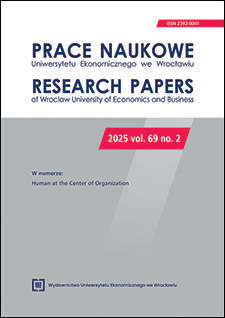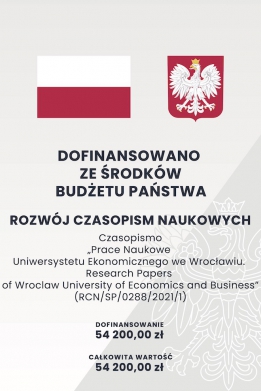Attitudes of Various Professional Groups towards the Use of Artificial Intelligence in the Migrant Recruitment Procedure
DOI:
https://doi.org/10.15611/pn.2025.2.01Keywords:
AI, recrutment proces, migrantsAbstract
Aim: This article analyzes the attitudes of various professional groups toward using artificial intelligence (AI) in migrant recruitment. It includes a theoretical section discussing the need to employ migrants, the role of AI in recruitment, and the concept of attitudes as drivers of human behavior, as well as an empirical section presenting workshop-based research findings.
Methodology: Interviews were conducted with three professional groups – academic teachers, HR specialists, and entrepreneurs (seven participants each) – to explore their views on AI’s usefulness in migrant recruitment.
Results: The findings indicate generally positive attitudes across all groups toward using AI in this context.
Implications: While no major differences were found between the groups, each highlighted different practical challenges in implementing AI. The study reveals a general openness to AI and outlines practical considerations for its application in recruitment.
Originality/value: The article presents original research contributing to the development of knowledge on improving migrant recruitment processes through AI.Downloads
References
Andrejuk, K. & Winiarska, A. (2020). Socjologia migracji przed pandemią i w czasach pandemii – „nowa generacja” teorii migracji i adaptacji w kontekście współczesnych wyzwań́ badawczych. Studia Migracyjne – Przegląd Polonijny, 4(178),
7-16. https://doi.org/10.4467/25444972SMPP.20.036.12773
Bartkowiak, G. (1988). Niepełnosprawni w przemysłowych zakładach pracy. Wydawnictwo Związków Zawodowych.
Bartkowiak, G. (2016). Zatrudnianie pracowników wiedzy 65 plus. Perspektywa pracowników i organizacji. Wydawnictwo Adam Marszałek.
Bartkowiak, G. (2021). Postawy nauczycieli wobec kształcenia dzieci imigrantów w polskich szkołach. Problemy związane z ich edukacją. In A. Karpińska, M. Zińczuk, & K. Kowalczuk (Eds.), Nauczyciel we współczesnej rzeczywistości edukacyjnej (pp. 267-286). Wydawnictwo Uniwersytetu w Białymstoku.
Bray, M. A., & Kehle, T. J. (2011). The Oxford Handbook of School Psychology. Oxford University Press.
Centers for Desease Control and Prevention (CDC). (2021). Promoting Health for Older Adults. Retrieved August 18, 2021, from https://www.cdc.gov/chronicdisease/resources/publications/%20factsheets/promoting-health-for-older-adults
Demirkan, H., Spohrer, J. C., & Welser, J. J. (2016). Digital Innovation and Strategic Transformation. IT Professional, 18(6),
14-18.
Dweck, C., & Henderson, V. (1989, April). Theories of Intelligence: Background and Measures. Paper presented at the Biennial Meeting of the Society for Research in Child Development, Kansas, MO (ERIC Document Reproduction Service No. ED 312 057).
Fehler, W. (2017). Sztuczna inteligencja – szansa czy zagrożenie? Studia Bobolanum, 3(28), 69-83.
Fiske, S. T., & Taylor, S. E. (2017). Stereotyping: Cognition and Bias. In S. T. Fiske, & S. E. Taylor (Eds.), Social Cognition – From Brains to Culture (3rd ed.). SAGE Publication.
Florczak, I. (2022). Sztuczna inteligencja jako narzędzie do kierowania polityką zatrudniania cudzoziemców? Studia z Zakresu Prawa Pracy i Polityki Społecznej, 29(2), 161-172. https://doi.org/10.4467/25444654SPP.22.013.15687
Fu, J., & Hsiao, Ch. (2023). The Data Mechanisms of Diagnosis and Intelligence. Symmetry, 15(278), 1-13, https://doi.org/10.3390/sym15020278
Gardner, H. E. (2011). Frames of Mind: The Theory of Multiple Intelligences. Cambridge University Press.
Gratch, J. (2021). The Promise and Peril of Automated Negotiators. Negotiation Journal, Winter 2021, 13-34.
Gwieździński, E. (2019). Świadomość́ i postawy konsumentów wobec stosowania artificial intelligence w komunikacji marketingowej. Przegląd Nauk Ekonomicznych, 31/8 PTE, 227-237. Retrieved January 3rd, 2024, from https://www.isbtech.pl/2023/07/podejscie-polakow-do-sztucznej-inteligencji/
Jatoba, M., Gutierriz, I., Fernandes, O. P., Teixeira, P. J., & Moscon, D. (2019). Artificial Intelligence in the Recruitment and Selection: Innovation and Impact for the Human Resource Management. “Rethinking Management in the Digital Era: Challenges from Industry 4.0 to Retail Management”. 43rd International Scientific Conference on Economic and Social Development – Aveiro, 15-16 July 2019, pp. 96-104.
Lange, R. (2019). Sztuczna inteligencja w społeczeństwie i gospodarce. Analiza wyników ogólnopolskiego badania opinii polskich internautów. NASK Państwowy Instytut Badawczy.
Licklider, J. C. (1960). Man-Computer Symbiosis. IRE Transactions on Human Factors in Electronics, 1, 4-11.
López-Hernández, L., Martínez-Arnau, F. M., Castellano-Rioja, E., Botella- Navas, M., & Pérez-Ros, P. (2021). Factors Affecting Attitudes towards Older People. Undergraduate Nursing Students Healthcare, 9, 1231. https://doi.org/10.3390/healthcare9091231
Mackintosh, N. (2011). IQ and Human Intelligence. Oxford University Press.
Malczewski, Ł. (2019). Czy leci z nami robot? Retrieved from https://dfusion.pl/wp-content/uploads/2019/03/Czy-leci-z-nami-robot_Raport_AI.pdf
Marody, M. (1976). Sens teoretyczny a sens empiryczny pojęcia postawy: analiza metodologiczna zasad doboru wskaźników w badaniach nad postawami. PWN.
Mądrzycki, T. (1977). Psychologiczne prawidłowości kształtowania się postaw. WSZiP.
Mika, S. (1984). Psychologia społeczna. PWN.
Mohanty, S., & Vyas, S. (2018). How to Complete in the Age of Artificial Intelligence: Implementing a Collaborative Human-
-Machine Strategy for Your Business. Apress. https://doi.org/10.1007/978-1-4842-3808-0
Norman, L. (2014). A Crisis of Confidence: Women Coaches’ Responses to Their Engagement in Resistance. Sport, Education and Society, 19(5). 532-551. https://doi.org/10.1080/13573322.2012.689975
Ore, O., & Sposato, M. (2021). Opportunities and Risks of Artificial Intelligence Recruitment and Selection. International Journal of Organizational Analysis, 30(6), 1771-1782. https://doi.org/10.1108/IJOA-07-2020-2291
Oviedo, L., Seryczyńska B., Torralba, J., Roszak, P., Del Angel, J., Vyshynska, O., Muzychuk, I., & Churpita, S. (2022). Coping and Resilience Strategies among Ukraine War Refugees. International Journal of Environmental Research and Public Health, 19, 13094, 1-14. 4. https://doi.org/10.3390/ijerph192013094
Pawlicka, A., Pawlicki, M., Tomaszewska, R., Choraś, M., & Gerlach, R. (2020). Innovative Machine Learning Approach and Evaluation Campaign for Predicting the Subjective Feeling of Work-Life Balance among Employees. PLoS ONE, 15(5).
Qamar, Y., Agrawal, R. K., Samad, T. A., & Jabbour, Ch. J. Ch. (2021). When Technology Meets People: The Interplay of Artificial Intelligence and Human Resource Management. Journal of Enterprise Information Management, 34(5), 1339-1370.
Rodney, H., & Durana, P. (2019). The Artificial Intelligence Recruitment Process: How Technological Advancements Have Reshaped Job Application and Selection Practices. Psycho Sociological Issues in Human Resource Management, 7(1), 42-47.
Rouse, W. B., & Spohrer, J. C. (2018). Automating versus Augmenting Intelligence. Journal of Enterprise Transformation,
8(1-2), 1-21.
Siddike, M. A. K., Spohrer, J., Demirkan, H., & Kohda, Y. (2018). A Framework of Enhanced Performance: People’s Interactions with Cognitive Assistants. International Journal of Systems and Service-Oriented Engineering, 8(3), 1-17.
Spijker, J.; Devolder, D., & Zueras, P. (2020). The Impact of Demographic Change in the Balance between Formal and Informal Old-Age Care in Spain. Results from a Mixed Microsimulation-Agent-Based Model. Ageing & Society, 1, 1-26.
Stasiuk, K., & Maison, D. (2014). Psychologia konsumenta. PWN.
Steffl, M., Jandova, T., Dadova, K., Holmerova, I., Vitulli, P., Pierdomenico, S. & Pietrangelo, T. (2021). Demographic and Lifestyle Factors and Memory in European Older People. International Journal of Environmental Research and Public Health, 9, 1231. https://doi.org/10.3390/healthcare9091231
Torczyńska, M. (2019). Sztuczna inteligencja i jej społeczno-kulturowe implikacje w codziennym życiu. Kultura i Historia, 36(2)
Wojciszke, B. (2021). Psychologia społeczna. Wydawnictwo Naukowe Scholar.
Zhou, L., Paul, S., Demirkan, H., Yuan, L., Spohrer, J., Zhou, M., & Basu, J. (2021). Intelligence Augmentation: Towards Building Human-Machine Symbiotic Relationship. AIS Transactions on Human-Computer Interactions, 13(2), 243-264. https://doi.org/10.17705/1thci.00149
Downloads
Published
License
Copyright (c) 2025 Grażyna Bartkowiak, Agnieszka Krugiełka

This work is licensed under a Creative Commons Attribution-ShareAlike 4.0 International License.
Accepted 2025-02-03
Published 2025-07-22









